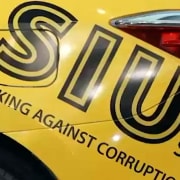|
Getting your Trinity Audio player ready...
|
“Nobody lives in a national address; everybody lives in a local address and it’s very important that we make sure that our local government works as it should, so that people can get the services that they deserve and secondly, so that the equitable share that is transferred to local government is used in the manner in which Parliament intended for it to be used.”
These words were uttered by Songezo Zibi, the chairperson of Parliament’s Standing Committee on Public Accounts (Scopa), at a meeting held on 29 January 2025 and focusing on local government. The committee met to hear from the Special Investigating Unit (SIU) on investigations the unit has conducted into the Alfred Nzo district municipality and the metropolitan municipalities of Buffalo City, City of Tshwane (CoT), and City of Johannesburg (CoJ). Representatives from the Auditor-General of South Africa (Agsa) were also in attendance, presenting on the audit outcomes of those metros for the 2022/2023 financial year.
Zibi was saying that everyone – even politicians – live in a local municipality somewhere and therefore it is in everybody’s interest to help ensure that local government fulfils its tasks and carries out its duties properly and as mandated.
Agsa’s Gauteng division gave 12 of the 14 audited entities in Johannesburg an unqualified opinion with findings, while the other two – Joburg Theatres and the Joburg Market – achieved clean audits. Tshwane received an overall qualified audit with findings. Two of its three entities under audit received unqualified audits with findings and the third, the city management, received a qualified audit opinion with findings – this is an improvement over last year when the latter division received an adverse opinion with findings.
In both cases Agsa made several recommendations which, if implemented, will improve audit outcomes. For more details, download and scrutinise the Agsa’s presentation.
SIU findings in Johannesburg
SIU head Advocate Andy Mothibi said the Johannesburg investigation was conducted under Proclamation R17 of 2019, which was amended by R12 of 2020. Under the proclamation the SIU was authorised to investigate allegations of serious maladministration, improper or unlawful conduct, and unlawful appropriation or expenditure of public money or property, among others, in certain of the metro’s affairs.
The investigation arose from whistle-blower allegations of irregular procurement procedures and awarding of tenders at the CoJ. Such procurement included, among others, vehicles and vehicle maintenance services, uniforms for Johannesburg Metro Police Department motorcyclists, and repairs and maintenance work at fire stations. There was also an investigation into possible corruption.
The SIU’s Gauteng head Sagren Reddy took the committee through the findings. In terms of procurement, the SIU found that the processes to secure vehicles and vehicle maintenance services were “grossly irregular”, but no irregularities were found in relation to the work done at fire stations. Nor did the SIU find irregularities in the procurement for office accommodation and furniture for the Integrated Operations Centre.
However, a service provider submitted duplicate invoices for CCTV equipment and related services, all of which the CoJ paid. The total amount to be recovered is R599 236.46 and the matter is currently with the SIU’s civil litigation unit.
The SIU also found that the tender process for the motorcyclist helmets and uniforms went from starting off as an open tender to ending up essentially as a closed tender, when new terms of reference were issued and only six service providers from the first stage were invited to submit bids.
The corruption allegations were investigated but not substantiated, and the investigation was closed.
The SIU shared a list of high-level observations it had made during its work on this proclamation. They are:
- Collusion between SCM officials, bid committee members and service providers, etc.
- Overpricing of goods and services.
- Product supplied does not meet specifications.
- Inadequate and/or gaps in the systems and processes.
- Weak regulatory and compliance monitoring.
- Inadequate skills and capacity.
- Poor oversight from the executive authority.
- Conflict of interest.
- Poor accountability and no consequence management.
- Poor record management.
- Leadership instability and poor management.
- No segregation of duties.
- Poor project and contract management.
SIU findings in Tshwane
Similar high-level observations were made in relation to the SIU’s Tshwane investigations, which included the matter of the appointment of a contractor to work on the Rooiwal wastewater treatment plant, done under Proclamation R138 of 2023. tTe community of Hammanskraal, which was rocked by a deadly cholera outbreak in May 2023 is one of those services by the Rooiwal plant.
The SIU became involved in the Rooiwal matter after it received a forensic investigation report from the municipality, who had commissioned the probe after the cholera tragedy. The contract, meanwhile, had been terminated in 2022 because of the contractor’s failure to perform, and the contractor had abandoned the site. Furthermore, the forensic investigation found that the tender had been irregularly awarded.
“The scope of the forensic investigation was limited to the awarding of the contract to the contractor,” said Reddy, so the SIU also delved into other aspects and/or contracts associated with the Rooiwal project, such as value for money and corruption.
The investigation is not yet fully complete, said Reddy, but to date the SIU has found non-compliance and possible fraud in the procurement focus area of the Rooiwal investigation. The corruption investigation and the investigations into oversight and service delivery/public interest respectively, which are the other focus areas, are ongoing.
The SIU is also investigating a CCTV procurement matter in Tshwane, which is incomplete with no findings as yet.
A third investigation was completed, looking into various areas such as irregular recruitment, selection, and appointment of staff; fruitless and wasteful expenditure; and interference by the city manager in disciplinary proceedings, among others.
Lifestyle audits crop up again
One of the SIU’s numerous recommendations for both metros was that to prevent conflicts of interests from marring public procurement processes, lifestyle audits and background checks must be conducted on officials involved in supply chain management (SCM) procedures. Officials would also have to undergo thorough training in SCM procedures.
Other recommendations included:
- Both municipalities must follow strict compliance of all policies, especially the procurement processes.
- Both municipalities must establish a proper document management system for all SCM and payment documents, and other documents.
- CoJ must establish a proper process for contract management where contracts awarded to service providers are monitored on an ongoing basis so that non-performance and defective performance can be addressed while the contract is running.
- CoJ must implement the SIU’s disciplinary referrals to ensure consequent management.
“Really following through on the implementation of systemic recommendations is going to be something that we have to do going forward,” Mothibi said. The SIU will also be focusing on prevention, he added.







